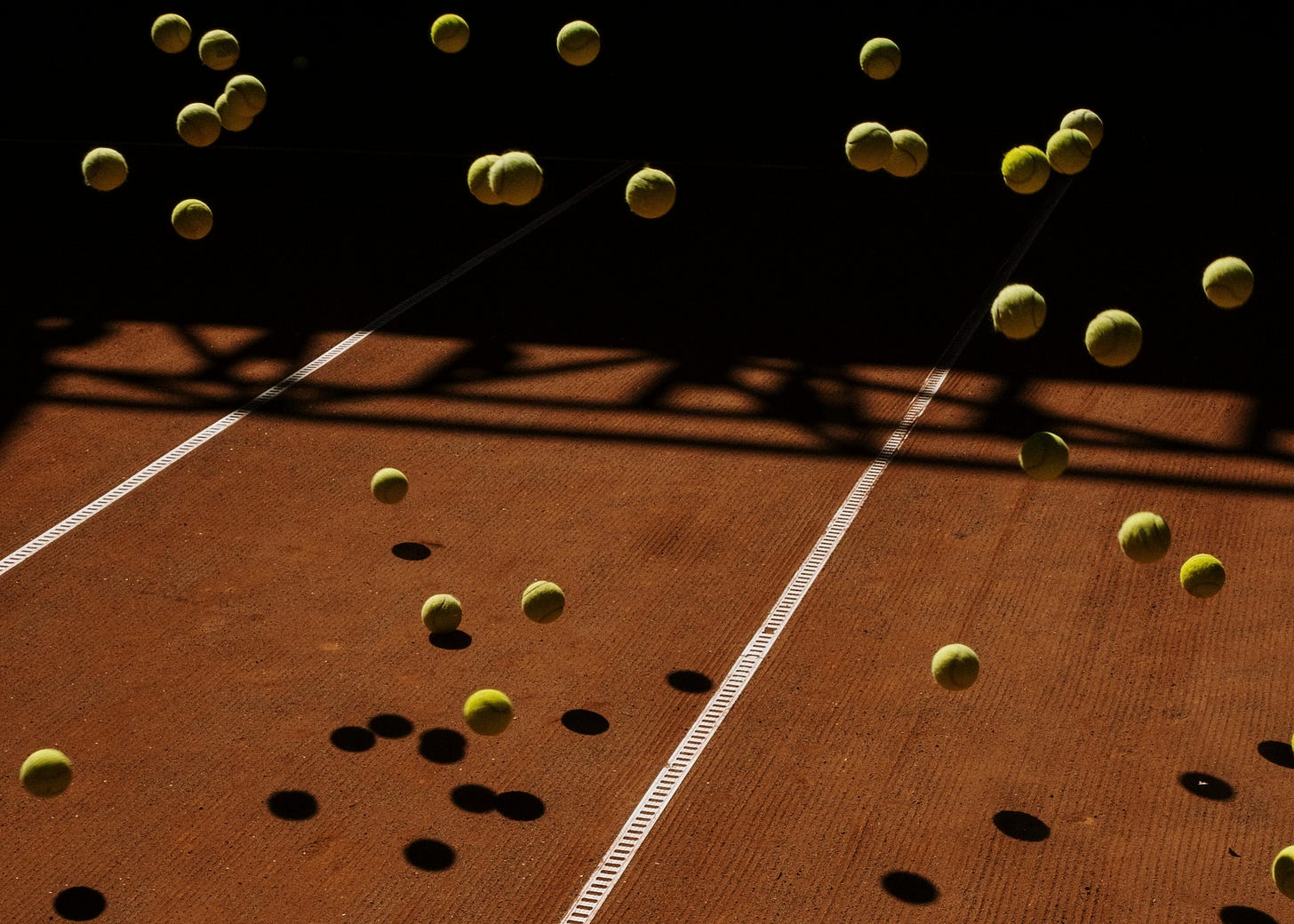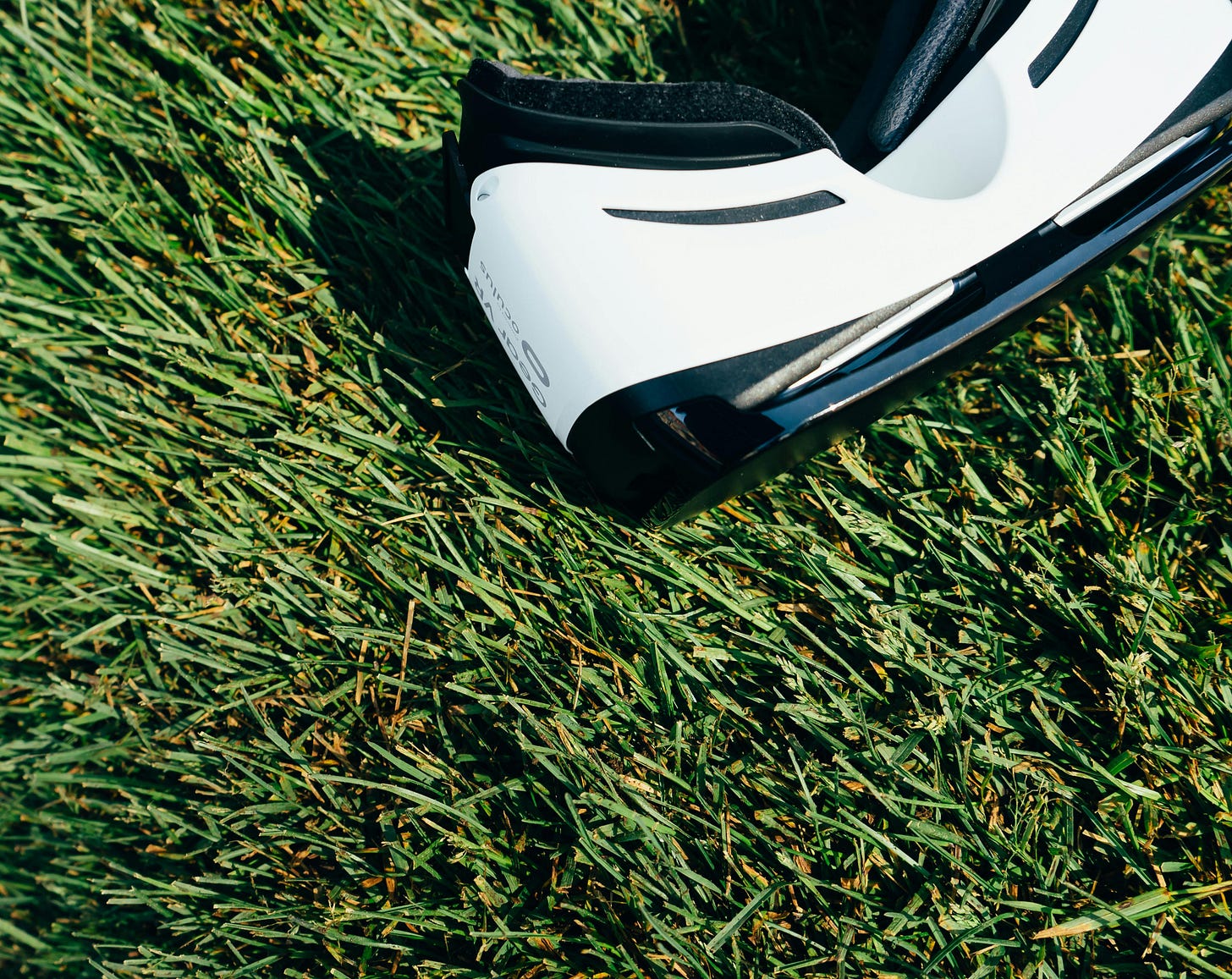Gradually, then suddenly, sport yields to the robots
#23: The inventor of Hawk-Eye and (gulp) VAR, the hidden science of bowling balls, how to play against a virtual reality Haaland, and Eurovision's invisible crew...

Tales from the fringes of sport and society…
In Ernest Hemingway's novel The Sun Also Rises, one character asks another how he went bankrupt. The response is,
"Two ways. Gradually, then suddenly."
In sport, it's easy to forget that it was only in the 90s that officials were signalling substitutions using bits of laminated card, and scoreboards were still operated by old blokes with flatcaps.
Yet just next month, Wimbledon will ditch human line judges for the first time in its 147 year history, in favour of electronic call-outs. Meanwhile, football’s new offside technology tracks 29 data points on each of the 22 players on the pitch, 50 times per second.
Sport’s technological revolution has happened in two ways. Gradually. Then suddenly.
These giant leaps are often the result of small steps made by individuals. Once-in-a-generation scientists and engineers unknown to the millions of fans watching sports that have billions of dollars invested in them.
And so if I ask you to name the most influential person in sport in the 21st century, who comes to mind?
Do you immediately think of the athletes who’ve rewritten the limits of human performance? Those who transcended their sports like Tiger Woods, Serena Williams, Michael Phelps, or Usain Bolt?
Or do you instead consider the great thinkers, those who’ve reimagined how sport is played and forced others to follow suit. Pep Guardiola transforming European football, Sir Dave Brailsford's game-changing theory of marginal gains in cycling, or Billy Beane, baseball's “moneyball” pioneer, who prompted a sporting revolution in analytics?
Or maybe you’re a little more cynical and your instinct is to follow the money. The sort of cash that creates permanent structural shifts unlike anything before it. Like Roman Abramovich becoming the first foreign oligarch owner at Chelsea, or more recently the Saudi Public Investment Fund, whose influence in boxing, motorsport, golf, and football continues to redefine the sporting landscape.
They’d all be perfectly reasonable answers. But I’ve got another nominee that you might not immediately think of. It’s someone who has not only changed the way sport is played on the court, pitch, or track, they’ve also changed the way fans consume it. And, in some cases, altered the way it is understood.
This person isn’t a player, a coach, or a big-money investor. He’s a computer scientist.
He didn't need trophies, the ear of powerful politicians, or a billion-dollar bank account to make his mark. Just some nifty cameras and a few lines of code.
I’m talking of Paul Hawkins, the man who invented Hawk-Eye and changed sport forever.
As the man behind LBW-tracking in cricket, automated line-calling in tennis, goal line technology in football, and the tech assistance you now see in dozens of other sports around the world, Hawkins has played a fundamental yet largely hidden role in sport’s digital makeover. Although given that this includes VAR, there will be days when he’s thankful for that anonymity.
In the latest episode of the Unsung podcast, we speak to Hawkins and track his remarkable story via three key moments in sport - one in cricket, one in tennis, and the other in football - that are responsible for paving this gradual then sudden path towards AI.
And so this month’s Off-Field newsletter is dedicated to the technological breakthroughs in sport and a little further afield. Read about the man who transformed the design of the humble bowling ball, explore the virtual reality headsets that let you step onto the pitch in a real-life Premier League match, and meet the lightning-fast innovators behind the spectacular staging of the Eurovision Song Contest.
Enjoy the selection.

Hawk-Eye: The AI visionary who revolutionsed sport
Paul Hawkins left Durham University in 1999 with a PhD in artificial intelligence and an unquenched passion for sport. When he walked into a job at Roke Manor Research, a technology company with a sometimes secretive history in the areas of defense and communications, he had an idea that would combine his two loves.
With only £5,000 of investment, he set out to develop Hawk-Eye. A quarter of a century later, and he’s changed the face of sport.
But, as the story goes, it needed rain in Nottingham, iffy line calls in New York, and a ghost goal in South Africa to get to where sporting tech is at today.
"If it wasn’t for Frank Lampard’s goal, maybe football would still be without technology."
Wherever you stand on VAR or the wider topic of technology in sport, it’s fair to say that Hawkins has heard it all. And in this episode he proves admirably open to discussing those criticisms, and ways he’d improve it.
Pre-order Off-Field Volume 1: shipping soon!
Many thanks to those who've pre-ordered a copy of Off-Field, our debut print anthology featuring 250 pages of meticulous longform writing, striking photography, bold design, and premium print production.
The warm response we’ve received since announcing our first volume has been encouraging and we’re excited to get it in your hands. Production is now in the final stages and shipping is expected to begin in the coming weeks.
In the meantime, any help spreading the word through social sharing or recommendations would be greatly appreciated. Your trust and enthusiasm have been instrumental in bringing Off-Field to life, and we’re so grateful to have you with us on this journey. And if you’re yet to pre-order a copy, you can do so below!

A new VR game puts you in the middle of real English Premier League plays
Wired
“As the soccer world tries to reckon with growing evidence of headers creating both short-term and long-term cognitive issues and loss of brain function, research has been conducted on the efficacy of VR programs that replace real-world heading during practice and training sessions. One study that specifically utilized Rezzil products found that its VR test group experienced “significant improvements” in both actual and perceived heading quality compared to a control group.”

In sport, the race is on to let technology decide who wins
FT
“At the Paris Olympics, Swiss Timing — which, through its sister company Omega, has links to the games going back to its role as timekeeper in Los Angeles, 1932 — introduced a new system for diving. It was able to track the distance between a high diver’s head and the diving board — information that judges could use to determine whether a jump had been executed safely, or whether to impose a points penalty.”

One man’s amazing journey to the centre of the bowling ball
Wired
“Bowling is easy to shrug off as a mere leisure pursuit - a boozy weekend pastime in which anyone with decent hand-eye coordination can perform well enough. But hardcore bowlers have a very different take on the sport: To them it’s a physics puzzle so elaborate that it can never be mastered, no matter how many thousands of hours they spend pondering the variables that can ruin a ball’s 60-foot journey to the pins. The athletes who obsess over this complexity also understand the debt they owe to Pinel, whose career as a ball designer was just beginning when he attended the Super Hoinke in 1993. Notorious as a bit of a colorful crank, he is also the figure most responsible for transforming how bowlers think about the scientific limits of their sport.”

Ex-England star aiming to give French rugby a Football Italia moment
The Times
“Having been so close to the spectacle of French rugby for 13 years, and having witnessed a sense of gloom around the English game amid the financial woe of recent seasons, Worsley wanted to spread the gospel. ‘Not just the game itself, but the passion that people have for it in towns and cities around France,’ he says.”

Meet the 'invisible crew' who have 35 seconds to prevent a Eurovision blunder
BBC
“The attention to detail is clinical. Backstage, every performer has their own microphone stand, set to the correct height and angle, to make sure every performance is camera perfect. ‘Sometimes the delegation will say the artist wants to wear a different shoe for the grand final,’ says Van Rouwendaal. ‘But if that happens, the mic stand is at the wrong height, so we've got a problem!’
The Formula
Joshua Robinson & Jonathan Clegg
“Long before Silicon Valley promised to move fast and break things, Formula 1 was driving faster and rebuilding things every year.”
When it comes to the convergence of technology and sport, few can rival Formula 1. In The Formula: How Rogues, Geniuses, and Speed Freaks Reengineered F1 into the World's Fastest-Growing Sport, authors and Wall Street journalists Joshua Robinson and Jonathan Clegg outline how the sport went from niche European pastime into a global entertainment powerhouse.
F1 is now the fastest growing sport in the world, but much of that is down to what is happening off track as much as on. The impact of Netflix series Drive to Survive is well documented, but Robinson and Clegg outline the many other commercial, technological, and storytelling factors - from Spygate to Crashgate - that have led to this peak level of popularity.
Thanks for reading May’s edition of Off-Field. If you enjoyed it, use the buttons below to like the newsletter, post a comment, or share it with others.
You can get in touch at hello@off-field.net
Read previous editions of Off-Field at offfield.substack.com/archive
Subscribe free for future editions of Off-Field, or share it with a friend:
“Credibility takes a long time to build up and a short amount of time to lose.” - Paul Hawkins











